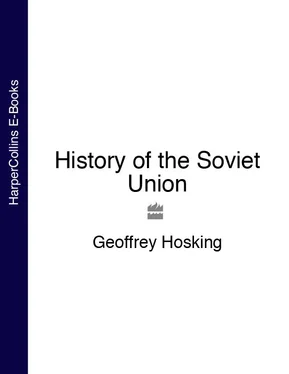The Bolsheviks had absolutely no clear answer to these questions. As we have seen, they were divided over how and even whether to seize power.
Even Lenin himself had no clear conception of how he was going to run the enormous, divided, war-torn country. He fully admitted this. Not long before the seizure of power, he said, ‘We do not pretend that Marx or Marxists know the road to socialism in detail. That is nonsense. We know the direction of the road, we know what class forces lead along it, but concretely, practically, this will be shown by the experience of millions when they decide to act.’ He did have a general vision, expounded in State and Revolution , of ordinary workers and peasants taking over the smoothly running mechanism of the imperialist economy. He evoked this vision frequently in the early days of the new regime, in language which mixed democratic voluntarism with ruthless authoritarianism. ‘Comrade workers,’ he exhorted them on 5 November 1917, ‘remember that you yourselves are administering the state. Nobody is going to help you if you do not yourselves unite and take over all state affairs. Rally round your soviets: make them strong. Get to work right there, at the grass roots, without waiting for orders. Institute the strictest revolutionary order, suppress without mercy the anarchic excesses of drunken hooligans, counterrevolutionary cadets [ yunkera ], Kornilovites, etc. Institute rigorous supervision over production and accounting over products. Arrest and deliver to the tribunal of the revolutionary people whoever dares to raise his hand against the people’s cause.’ This was the language of the utopian, confident that he is already on the threshold of the ideal society.
Some of the very early Bolshevik legislation did seem to be putting this vision into practice by creating or strengthening institutions through which workers, peasants and soldiers could gain greater control over their own fate and also over the running of the country.
1. The land decree of 26 October 1917 abolished all private landownership without compensation, and called on village and volost (rural district) land committees to redistribute the land thus secured to the peasants on an egalitarian basis. The decree was couched in the words of a Peasant Congress of June 1917. It reflected the Socialist Revolutionary programme and gave the peasants what most of them wanted at the time, while making no mention of the ultimate Bolshevik aim of nationalization of the land.
2. The decree of 14 November 1917 on workers’ control gave elected factory committees the power of supervision ( kontrol ) over industrial and commercial enterprises, for which purpose commercial secrecy was to be abolished.
3. Decrees of November and December 1917 abolished all ranks, insignia and hierarchical greetings in the army and subordinated all military formations to elected committees of soldiers, among whose duties would be the election of their officers.
4. Existing judicial institutions were replaced, in a decree of 22 November 1917, by ‘people’s courts’, whose judges would be elected by the working population. Special revolutionary tribunals were to be elected forthwith by the soviets to deal with counterrevolutionary activity, profiteering, speculation and sabotage.
On the other hand, some of the Bolsheviks’ very earliest measures pointed in the other direction, towards tighter central authority. On 2 December 1917 a Supreme Council of the National Economy was set up, almost universally known by its initials, VSNKh (or Vesenkha ), to ‘elaborate general norms and a plan for regulating the economic life of the country’ as well as to ‘reconcile and coordinate’ the activities of other economic agencies, among them the trade unions and factory committees. In January 1918 the factory committees were converted into local branches of the trade unions, and the whole structure subordinated to Vesenkha. This was not necessarily done against the wishes of the workers themselves: indeed there is a good deal of evidence that, to keep production going at all in the desperately difficult economic circumstances, many factory committees were only too glad to seek support from some larger entity. Nevertheless, in practice it meant that the economy was becoming very centralized even before the civil war broke out.
The same was true of the decision to set up the Cheka — or, to give it its full name, the Extraordinary Commission for Struggle with Counterrevolution and Sabotage — instituted by Sovnarkom on 7 December 1917. Its immediate task was to combat looting, hooliganism and black market trading, which had increased alarmingly, and to keep watch on organizations known to be opposed to the Bolsheviks. In its early appeals it tried to mobilize the population in the same style as Lenin: ‘The Commission appeals to all workers, soldiers and peasants to come to its aid in the struggle with enemies of the Revolution. Send all news and facts about organizations and individual persons whose activity is harmful to the Revolution and the people’s power to the Commission …’ In practice, the Cheka was never subordinated to any soviet institution, nor indeed to any party body, only to Sovnarkom, and was able to extend its powers unchecked.
Another source of uncertainty about the new Soviet regime was its relation to the outside world. Lenin had encouraged the seizure of power in the expectation that its example would provoke workers’ revolutions in other countries of Europe, especially in Germany. As the months passed and this did not happen, it became clear that the Bolsheviks were going to have to honour their pledge to end the war, not through negotiations with a friendly, socialist Germany, but by reaching some kind of agreement with the old imperial Germany. Given the weakness of the Russian army, which the Bolsheviks themselves had fostered, this could only mean acceptance of whatever terms the German generals cared to dictate. Trotsky, as the newly appointed commissar for foreign affairs, tried to put the new-style ‘public diplomacy’ into effect by addressing the German people directly over the heads of their leaders, but his words produced no immediate effect.
The dilemma of how to deal with this situation very nearly tore the Bolshevik Party in two once again. The Germans were demanding the Baltic provinces and the whole of Bielorussia and the Ukraine, which meant losing a substantial proportion of Russia’s industrial and agricultural wealth. The Left Communists, led by Bukharin, argued that to accept this meant capitulating to imperialism and losing a golden opportunity to continue the world revolution which October had started. Bukharin agreed with Lenin that the Russian army was no longer capable of holding back the Germans in regular warfare, but he rejected this concept of warfare:
Comrade Lenin has chosen to define revolutionary war exclusively as a war of large armies with defeats in accordance with all the rules of military science. We propose that war from our side–at least to start with–will inevitably be a partisan war of flying detachments. … In the very process of the struggle … more and more of the masses will gradually be drawn over to our side, while in the imperialist camp, on the contrary, there will be ever increasing elements of disintegration. The peasants will be drawn into the struggle when they hear, see and know that their land, boots and grain are being taken from them–this is the only real perspective.
Bukharin’s views certainly had wide support in the party. They may appear quixotic, but his recipe for involving the masses, especially the peasants, in the revolution through partisan warfare against an occupying power does closely resemble the methods of later successful Communist leaders, such as Mao, Tito and Ho Chiminh. Lenin, however, took the line of strict Realpolitik. The most precious possession of the world revolution, he argued, was that a Soviet government existed in Russia. That, above all, must not be placed in jeopardy. It followed that the only possible policy was to gain a ‘breathing space’ by capitulating to the German demands and preserving what could be preserved while postponing international revolution to the distant future.
Читать дальше












